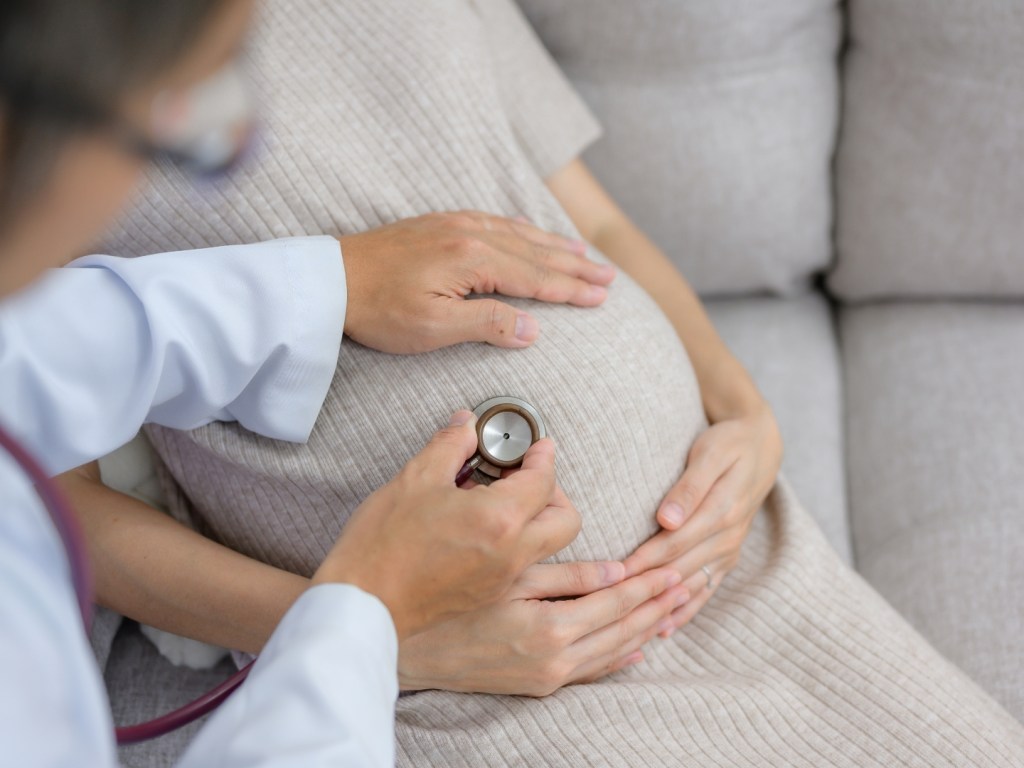Can Uterine Fibroids Cause Infertility?

[ad_1]
Uterine fibroids are more common than you might realize. According to the Journal of Gynecology & Obstetrics, they affect up to 80 percent of people with a uterus, with those of African descent being more likely to experience them. And they’ve been in the news more often over the last few years, too; in 2020, then-Senator Kamala Harris introduced a bill to Congress that aimed to push more funding towards uterine fibroid research, while raising awareness for the very common but under-recognized issue. And it’s time we talked about them more, because uterine fibroids can impact everything from fertility to your daily quality of life.
“Uterine fibroids are very common, benign growths of uterine muscle tissue,” board-certified OBGYN Dr. Kelly Culwell tells SheKnows. While uterine fibroid symptoms can vary depending on where on the uterus the fibroid(s) are, Culwell notes that they can cause “heavy, painful periods or pelvic pressure or pain, even when not having your period.” For some people, though, fibroids won’t cause any symptoms at all, particularly if they’re small.
That means some people might not even realize they have fibroids until they start causing problems — which can include effects on fertility and miscarriage.
Can uterine fibroids cause infertility?
“Fibroids can contribute to infertility,” Culwell says, but she notes that “most people with fibroids will not have any issues with infertility.” According to the American Society for Reproductive Medicine, about five to 10 percent of infertile women have fibroids, and studies estimate that fibroids are the sole cause of infertility in one to three percent of people who have them.
Whether fibroids affect fertility has a lot to do how big they are and where they’re located. If you have a fibroid within the uterine cavity (called a submucosal fibroid), for example, or one that’s larger than six centimeters in diameter within the wall of the uterus, your fertility might be impacted, per ASRM. “Very large fibroids can cause issues as a pregnancy progresses because they can outgrow their blood supply and start to degenerate, which can cause significant pain,” Culwell explains.
Sometimes fibroids can also “lead to a physical change in the uterus shape,” Dr. O. Lawrence Stitt, an OBGYN who specializes in fibroids, tells SheKnows. “For example, your fibroids could obstruct the shape of your uterus, and create a distortion of your endometrial cavity, or be in a tricky position and block access to your fallopian tubes.” Fibroids also “tend to grow as a result of an increase in hormones,” Stitt notes, so “there is a chance your fibroids grow as the uterus expands during pregnancy.”
Can uterine fibroids cause miscarriage?
Similarly, fibroids in certain locations can also lead to miscarriage. Those same submucosal fibroids within the uterus “can make it more difficult for the fertilized egg to successfully implant into the uterus which can cause an increased risk for miscarriage,” Culwell says. Fibroids can also “cause miscarriage by preventing the implanted embryo from getting the necessary nutrients and blood supply from the uterus,” Dr. Stitt adds. If an embryo physically implants on top of a fibroid, for example, “the fibroid will prevent the embryo from receiving the necessary blood supply from the uterus needed for development,” he explains.
Fibroids can also increase the risk of certain pregnancy complications, Stitt says, like placental abruption (the placenta detaching from the uterus during delivery), fetal growth restriction (when the fetus is small for its gestational age), and preterm delivery. Submucosal and intramural fibroids (fibroids within the muscular walls of the uterus) can also increase the chance of miscarriage, he adds.
Treating fibroids and infertility
If you’re experiencing issues with fertility, the first thing to do is talk to your doctor. They will “likely get an ultrasound or other imaging of the uterus to evaluate for any abnormalities of the uterus, including fibroids,” Culwell explains.
If they determine that fibroids are contributing to the issue, they might remove any growths surgically. They’re more likely to do this if the fibroids are “very large or pushing into the uterine lining where it might impact the ability of a pregnancy to implant into the uterus,” Culwell explains. “In general, removal of fibroids prior to pregnancy would be recommended if the fibroids are causing issues with getting or staying pregnant or if they are very large.”
When patients with fibroids are prioritizing fertility, doctors typically use “minimally invasive procedures, such as hysteroscopic or laparoscopic myomectomy, like Hologic’s MyoSure procedure, which remove fibroids but not the uterus,” Stitt says, so those are good options to ask your doctor about.
Any issues with your reproductive health and fertility can be scary to confront, but it’s important to remember that the majority of people with uterine fibroids are able to conceive without an issue. If you have already been diagnosed with fibroids and are worried about your fertility, check in with your doctor to get a sense for your personal risks and treatment options.
Before you go, read up on these yoga poses you’ll want to skip when you’re on your period:
[ad_2]






